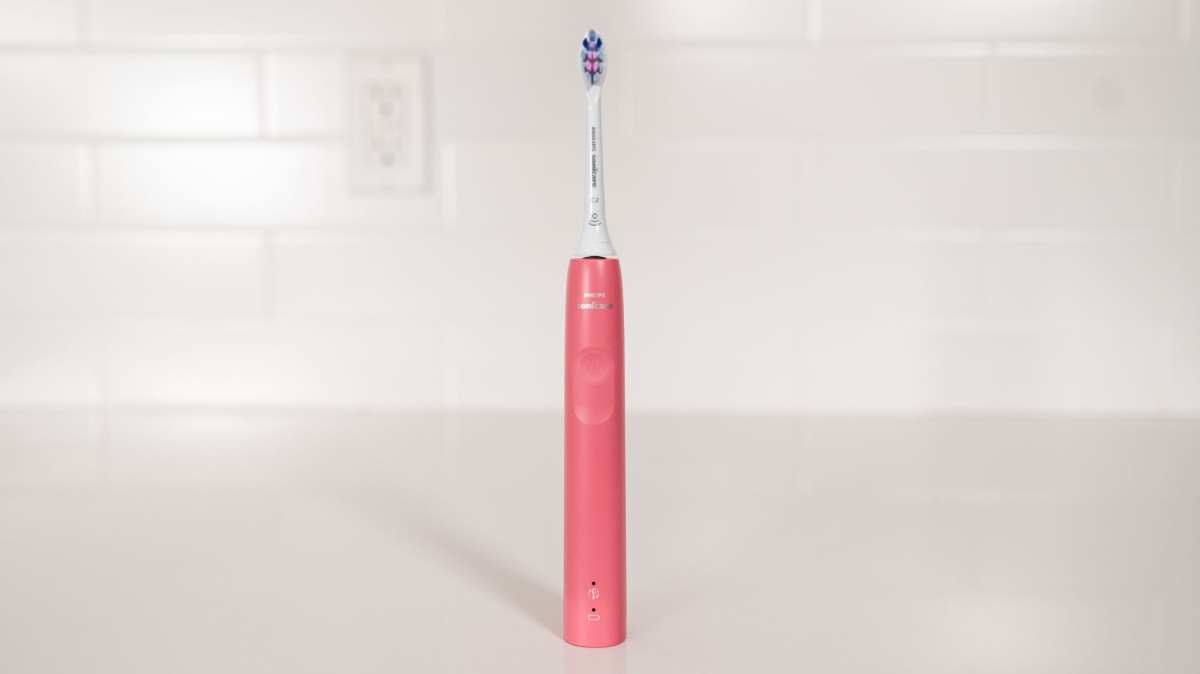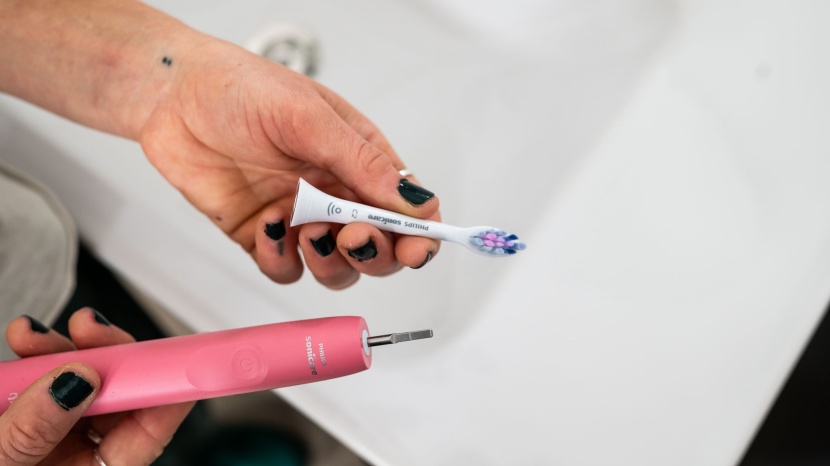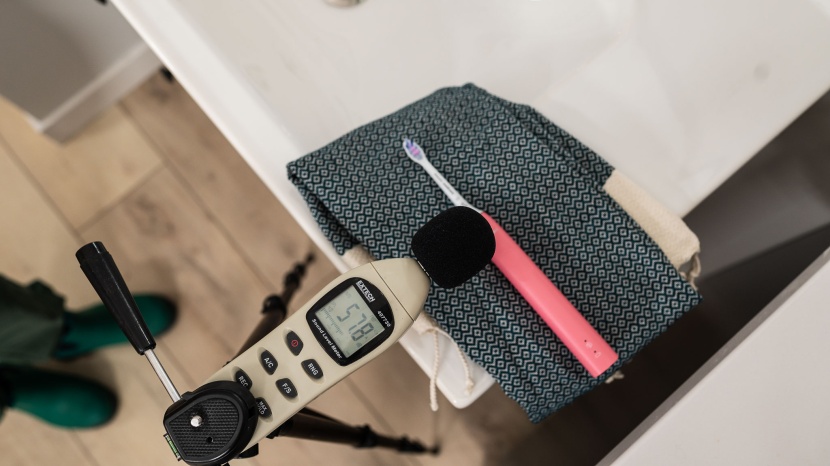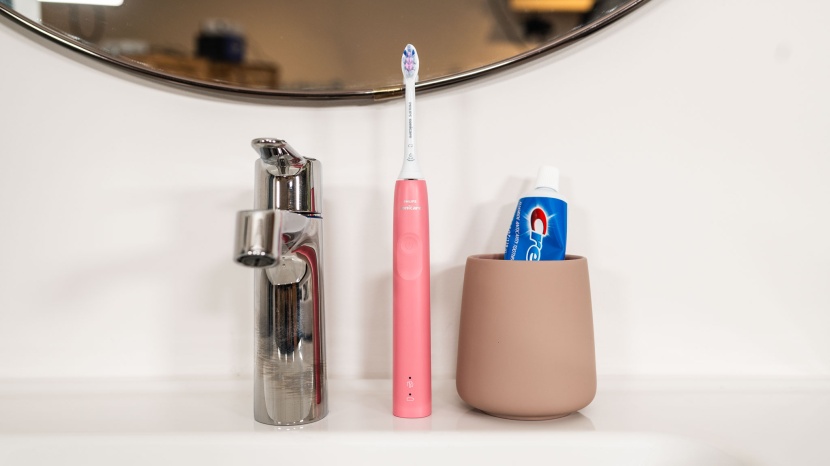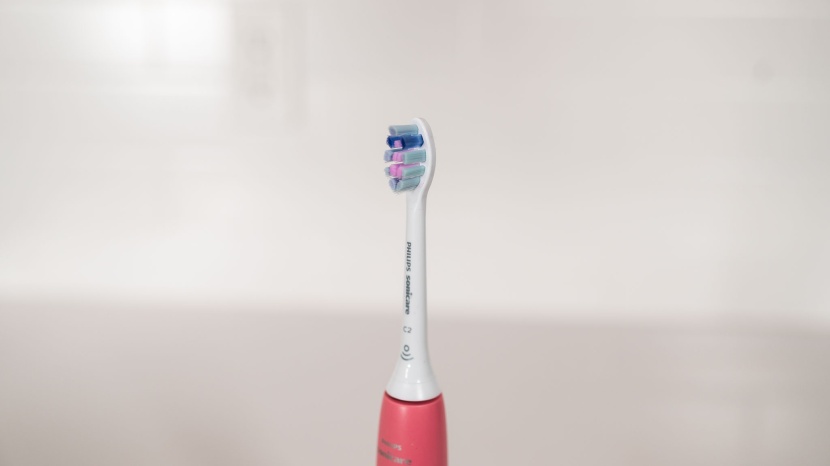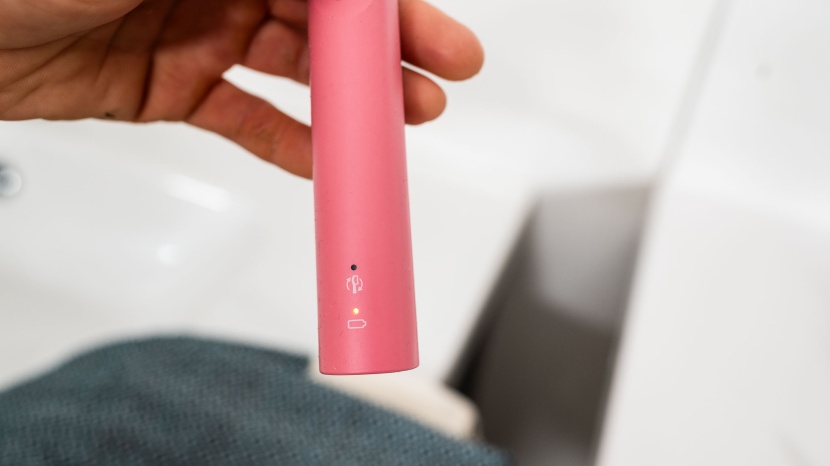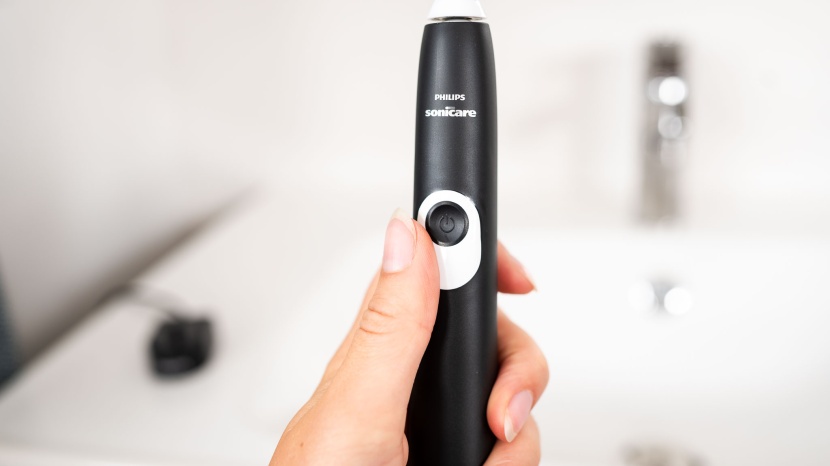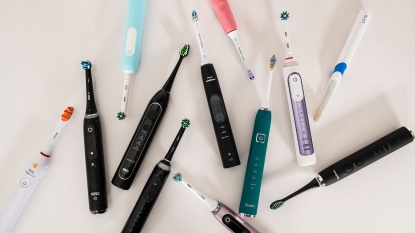Our Verdict
Compare to Similar Products
 This Product Philips Sonicare 4100 | |||||
|---|---|---|---|---|---|
| Awards | Best Value Electric Toothbrush | Most Gentle, Great Battery Life and Value | Best Value for Included Brush Heads | ||
| Price | $50 List $47.90 at Amazon | $60 List $39.99 at Amazon | $40 List $39.96 at Amazon | $30 List $27.99 at Amazon | $60 List $39.95 at Amazon |
Overall Score  |
|||||
| Star Rating | |||||
| Bottom Line | Inexpensive yet fully capable, this electric toothbrush is a solid choice for just about everyone | Modern look and a strong battery life, but lacking some tech and cleaning features | An gentle, minimalist toothbrush with a long-lasting battery that cleans well | A great entry level option, but falls a little short in terms of overall cleaning ability | Affordable, effective, and user-friendly — this device offers value with good cleaning and extra brush heads |
| Rating Categories | Philips Sonicare 4100 | Quip Smart | Philips One | Quip | Aquasonic Black Series |
| Cleaning (40%) | |||||
| Comfort (30%) | |||||
| Ease of Use (20%) | |||||
| Battery Life (10%) | |||||
| Specifications | Philips Sonicare 4100 | Quip Smart | Philips One | Quip | Aquasonic Black Series |
| Measured Battery Life | 49.5 days | 170 days | 30 days | 170 days | 31 days |
| Pressure Sensor | Yes | No | No | No | No |
| Number of Brushing Modes | 1 mode: Clean 2 sensivity levels |
1 mode: Clean |
1 mode: Clean |
1 mode: Clean |
4 modes: Clean, Soft, Whiten, Massage |
| Estimated Annual Brush Head Cost | $44.96 for (1) four pack | $28 for (4) 1 packs | $15.92 for (2) two packs | $28 for (4) 1 packs | $19.90 for (2) two packs |
| Charger or Battery Info | USB (block not included) |
1 AAA battery | USB | 1 AAA battery | 100 - 240VA 50-60Hz 0.8 - 1.6W |
| American Dental Association accepted? | Not Listed | Yes | Not Listed | Yes | Yes |
| Waterproof / Resistant | Yes, can use in shower | Yes, can use in shower | No, cannot be used in the shower | Yes, can use in shower | Yes, can use in shower |
| Number of Brush Head Styles Available | 8 styles, most available in 2 colors | 2 styles available in multiple colors | 1 style available in multiple colors | 1 style available in multiple colors | 3 |
| Number of Included Brush Heads | 1 | 1 | 1 | 1 | 8 |
| Thirty Second Reminder | Yes | Yes | Yes | Yes | Yes |
| Two Minute Alert | Yes | Yes | Yes | Yes | Yes |
| Travel Case Included | No | Yes | Yes | Yes | Yes |
| Measured Handle Weight | 3.2 oz | 1.5 oz | 1.4 oz | 1.2 oz | 3.6 oz |
| App | No | Yes | No | Yes* *must manually enter data unless using a Smart model |
No |
| Available Colors | 3 | 3 | 4 | 6 | 1 |
| Decibels from 6ft Away | 42 dB | 40 dB* | 40 dB* | 40 dB* | 53 dB |
| Decibels from 3" Away | 58 dB | 40 dB* | 40 dB* | 40 dB* | 68 dB |
Our Analysis and Test Results
We loved the Philips Sonicare 4100 for many reasons, including it's standout cleaning ability and streamlined design, especially the single-button operation — a dream for those who prefer not to fuss with a plethora of buttons and settings. We appreciated the “Easy Start” feature, which initiates with a gentle start and gradually increases power over 14 days to acclimate your teeth and gums. This is great for folks new to an electric toothbrush. Overall, this toothbrush performed admirably across multiple tests.
Cleaning
Our most important metric is cleaning, which is why it makes up 40% of the final score. To properly gauge the efficiency and ability of each electric toothbrush, our testers chewed a plaque-dispensing tablet, highlighting plaque in a distinctive pink hue. Subsequently, a before photo was captured. Our testers then engaged in a thorough 2-minute brushing session before rinsing and snapped an after photo. Before examining their teeth, testers were prompted to provide feedback on the perceived cleanliness of their teeth. This evaluation, relying on a gut feeling, proved to be a trustworthy method for assessing the overall performance of each toothbrush.
The Philips Sonicare 4100 lived up to expectations. Its compact brush head effortlessly navigated each quadrant, successfully eliminating nearly every trace of plaque. However, a minuscule amount was left, and a few more seconds of brushing would have rectified this. Overall, this is a pleasing result.
To explore every facet, we incorporated an additional visual test. We applied a messy mixture of coffee grounds and pesto to an artificial dental model. Afterward, a 1-minute brushing session ensued. The Phillips demonstrated great efficiency, effortlessly navigating through the teeth and gums and effectively clearing away all debris.
Comfort
Recognizing that cleaning is the primary consideration for folks selecting an electric toothbrush, we acknowledge that comfort holds nearly equal importance. Given that people use their selected brush both in the morning and at night, comfort plays a significant role, accounting for 30% of the overall score. Testers delved into common questions such as “How does the brush head feel?” and "Are the vibrations comfortable or somewhat jarring?"
Fortunately, the Phillips 4100 provided us with great answers. This model defaults to a low-intensity setting, easily adjustable by pressing the main button twice within two seconds if more power is desired. Those with sensitive gums may prefer the default setting for optimal comfort, while experienced electric toothbrush users can choose higher power if necessary. The somewhat small brush head received praise, proving suitable for nearly everyone and effectively reaching every nook and cranny of the mouth without any discomfort.
The sound intensity of each toothbrush was also recorded using a decibel reader from 3 inches and 6 feet away. The Phillips Sonicare 4100 landed at 42 and 58 decibels, respectively. This is relatively moderate and not overly noticeable or annoying. In contrast, some toothbrushes we tested rated upwards of 80 decibels, which starts to feel loud and grating.
Ease of Use
Those new to the world of electric toothbrushes will likely want a straightforward option. The fewer complications between you and dental hygiene, the better. This is why ease of use consists of 20% of the overall score. In order to test this, we explored how many modes each brush had, how simple it was to switch between them, along with the responsiveness of the button(s). If a brush offers more than a few modes, it can often get needlessly complicated. We also determined how difficult each brush was to clean and if it had storage for extra brush heads.
The Phillips continues to shine. Those who are new to electric toothbrushes and prefer a minimalist approach will enjoy this model, which features only one mode with two settings: high and low intensity. You can switch between either intensity by pressing the power button twice within two seconds. While this design makes it intuitive to operate, it's worth noting that there is no indicator light to signify the current mode, resulting in a minor score penalty.
We were pleased to discover that this device also provides a two-minute timer. It'll vibrate quickly four times when the two minutes have passed, and during that time frame, it will briefly stop to indicate that it's time to switch quadrants. Both features are handy for a thorough cleaning and require very little from the user. Additionally, it includes a pressure sensor to alert you if you're brushing too aggressively, along with a reminder for brush head replacement. A notable drawback of this device is the absence of a travel case and storage for additional brush heads.
Battery Life
To test the overall battery life, we used the brushes twice a day for two minutes (four minutes total). We took notice as soon as each brush reached the end of its charge and jotted down the results. This makes up 10% of the final score.
Lasting 49.5 days, the Philips Sonicare 4100 is more than capable. Phillips claims a modest 14-day battery life, so we were happy with the result of this test. The battery status is indicated by a light on the back, with a solid green glow for a full charge and blinking green for a partial charge. As it nears the end of the charge, it will flash orange and emit five beeps on two separate occasions. Additionally, this device doesn't include a robust charging station. Instead, it comes with a modest USB cord and a small dock, which can take up to 24 hours to fully charge the toothbrush.
Should You Buy the Philips Sonicare 4100?
Our response is a satisfyingly straightforward yes, but with some minor considerations. It doesn't come with a travel case or storage for your extra brush heads. Additionally, it lacks a robust charging station. Nevertheless, the Philips Sonicare 4100 excels in every other category and is unquestionably one of the best electric toothbrushes, particularly for those seeking something streamlined, easy to operate, and efficient.
What Other Electric Toothbrushes Should You Consider?
If you find yourself in need of amenities such as a charging dock and storage for additional brush heads, consider looking at the Philips Sonicare ProtectiveClean 5100. It essentially covers all the aspects the 4100 lacks but comes with a higher price tag. For a more budget-friendly option that leans towards the simplicity of a manual brush and offers ultra-quiet operation, the Quip is worth considering. It's easy to use and comes at an even more affordable price point.


